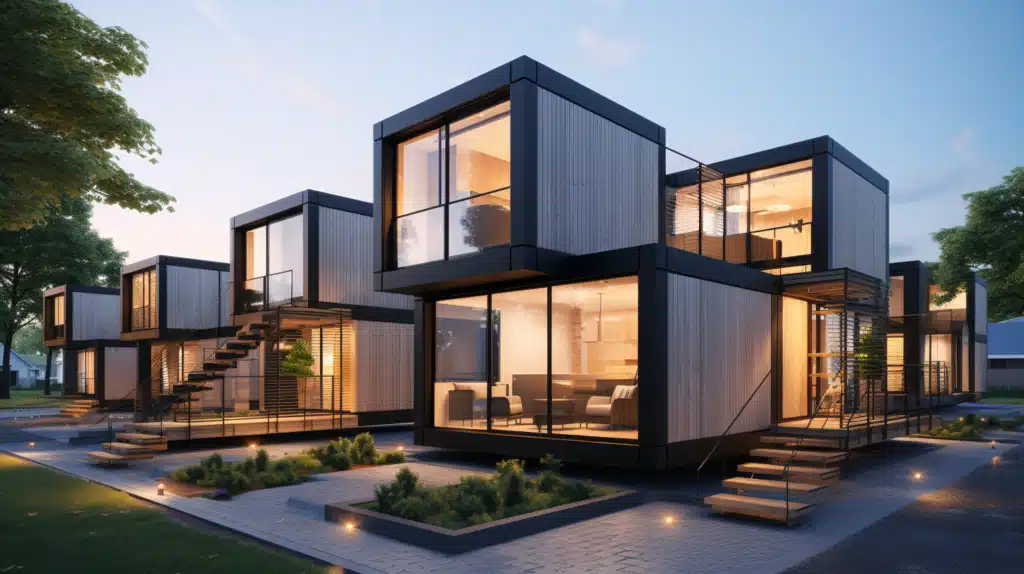The Resurgence of Modular Homes: Reshaping the Real Estate Landscape
In the ever-evolving landscape of real estate, the resurgence of a century-old concept—the modular home—is garnering attention and reshaping the way we perceive sustainable, cost-effective living spaces. While once relegated to catalogs and historical memory, modular homes are making a triumphant return, propelled by affordability constraints and a growing interest in eco-friendly living.
Embracing a New Era of Homebuilding
Historically, modular homes were synonymous with kit-built structures, echoing an era when homeowners flipped through catalogs for their dream abode. Fast forward to today, and these dwellings have undergone a remarkable evolution. With affordability concerns at the forefront and a heightened focus on sustainability, the contemporary modular home has emerged as a beacon of innovation and practicality.

Redefining Sustainability and Efficiency
One compelling facet of modular homes lies in their eco-friendly construction methods. Green construction experts extol their virtues, citing reduced waste and minimal disruption to natural habitats during assembly. Unlike their predecessors, today’s modular homes arrive as sizable, pre-assembled segments, minimizing the need for thousands of separate materials traditionally used in construction.
Affordable Housing Solutions
The housing market’s challenges, from fluctuating mortgage rates to soaring property prices, have fueled interest in modular construction as a viable solution. Initiatives across major metros, backed by governmental support and collaborations with non-profits, signal a shift towards affordable modular housing. Projects in Chicago and the Maryland suburbs showcase the potential for modular homes to address housing scarcity and affordability issues.
Unveiling the Cost Efficiency
Comparing construction costs reveals a significant advantage of modular homes over traditional methods. With an average of $80 to $160 per square foot, modular construction slashes expenses by 10-20%. This translates to a substantial reduction in building costs, offering prospective homeowners an appealing alternative to traditional construction expenses.
Rethinking Financial Viability
The financial implications of choosing modular homes are profound. Notably, a comparative analysis demonstrates the stark contrast in down payments and mortgage expenses. For instance, a 30-year fixed mortgage at 7.25% interest for a high-end modular home significantly differs from its traditional counterpart, making the former a financially prudent choice for many prospective homeowners.
Innovation Driving Change
Venture capital investments in modular construction signify a growing belief in its potential. Startups leveraging technological advancements, such as 3-D printing for automated construction processes, are emblematic of an industry embracing innovation to redefine homebuilding standards.
Environmental Consciousness at Its Core
The modular home sector aligns with the burgeoning trend towards net-zero living and energy efficiency. Leading manufacturers incorporate solar panels and emphasize efficient use of materials, echoing a commitment to environmental sustainability.
Debunking Misconceptions
While modular homes boast sustainability advantages, misconceptions abound. Critics question their actual environmental impact, highlighting the need for rigorous evaluation of companies’ sustainability practices. The industry’s integrity hinges upon responsible material sourcing, waste reduction, and non-toxic building practices.
Overcoming Perceived Challenges
Despite its promise, modular construction encounters hurdles in widespread adoption. Factors such as contractor familiarity and upfront financing requirements remain pivotal challenges impeding its broader acceptance among American consumers.
Looking Beyond Borders
Globally, modular homes have gained traction, illustrating their prevalence and rapid construction. However, their popularity in the U.S. lags behind traditional on-site building methods, revealing an untapped potential awaiting exploration.
Future Prospects and Considerations
In a landscape marred by greenwashing and varying sustainability claims, the onus lies on developers, builders, and buyers to discern genuine sustainability in modular construction. Critical evaluation of companies’ eco-credentials and building practices becomes imperative in shaping a truly sustainable future.
In essence, modular homes embody not just a housing solution but a paradigm shift towards sustainable, efficient, and financially viable living spaces. As the industry evolves and challenges are addressed, the potential for modular homes to redefine the real estate sphere remains unparalleled.